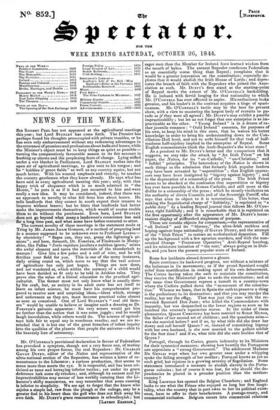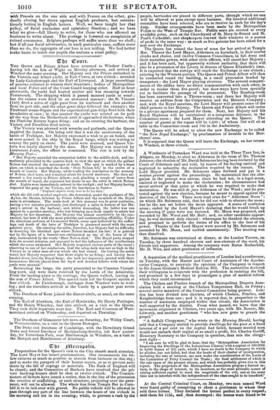Some few incidents abroad deserve a glance.
Spain continues its backward progress, not without a mixture of the ludicrous in its movements; as if the proud Spaniard sought relief from mortification in making sport of his own debasement. The Cortes having taken the oath to maintain the constitution, they receive the Ministerial plan to undo the constitution ; and at the same time Government repress a tumult in a country-town where the Carlists pulled down the "monument of the constitu- tion?' Whence we learn, that in Spain the oath to preserve a thing is the preliminary to its destruction ; and that you may murder the reality, but not the effigy. That was just the case with the re- nowned Spaniard Don Juan ; who killed the Commendatore with impunity, but was despatched to the lower regions as soon as he insulted the veteran's equestrian statue. In the midst of these pleasantries, Queen CHRISTINA has been married to Senor MuNoz, the father of her second set of children ; and the questions arise— was she married before ? and if so, by what title did she draw her dowry and call herself Queen ? or, instead of committing bigamy with her own husband, is she now married to the gallant soldier for the first time ? and if so, what title did she earn besides that of Queen ?
Portugal, through its Cortes, grants indemnity to its Ministers for their tyrannical measures; showing how heartily the Portuguese can appreciate a "strong Government." The adolescent Madame DE GENLIS wept when her own greater ease under a whipping spoke the failing strength of her mother ; Portugal knows as yet no such grief, but rejoices in a growing severity of flagellation. Some statesmen introduced a measure to abolish slavery in the Portu- guese colonies ; but of course it was lost, for why should the de- pendencies be placed in a prouder position than the mother. country ? King LEOPOLD has opened the Belgian Chambers ; and England looks to see what the Prince who enjoyed so long her free hospi- tality, what the country that in part o‘bes to her its political exist- ence, have to offer to their benefactress. A postage-treaty, and commercial exclusion. Belgium enters into commercial relations with Prussia- on the one side and with France on the other, gra- dually closing her doors against English products, but ostenta- tiously letting in English letters. Well, we have taught her that policy, of fiscal exclusion and epistolary freedom ; and we have what we give—full liberty to write, for those who are allowed no business to write about. The postage is lowered on complaints of ruined commerce. Belgium perhaps will suffer more than we shall; but if all our fiscal adversaries, in each particular case, suffers more than we do, the aggregate of our loss is not trifling. We had better Make haste to teach our pupils the nations a wiser policy.



























